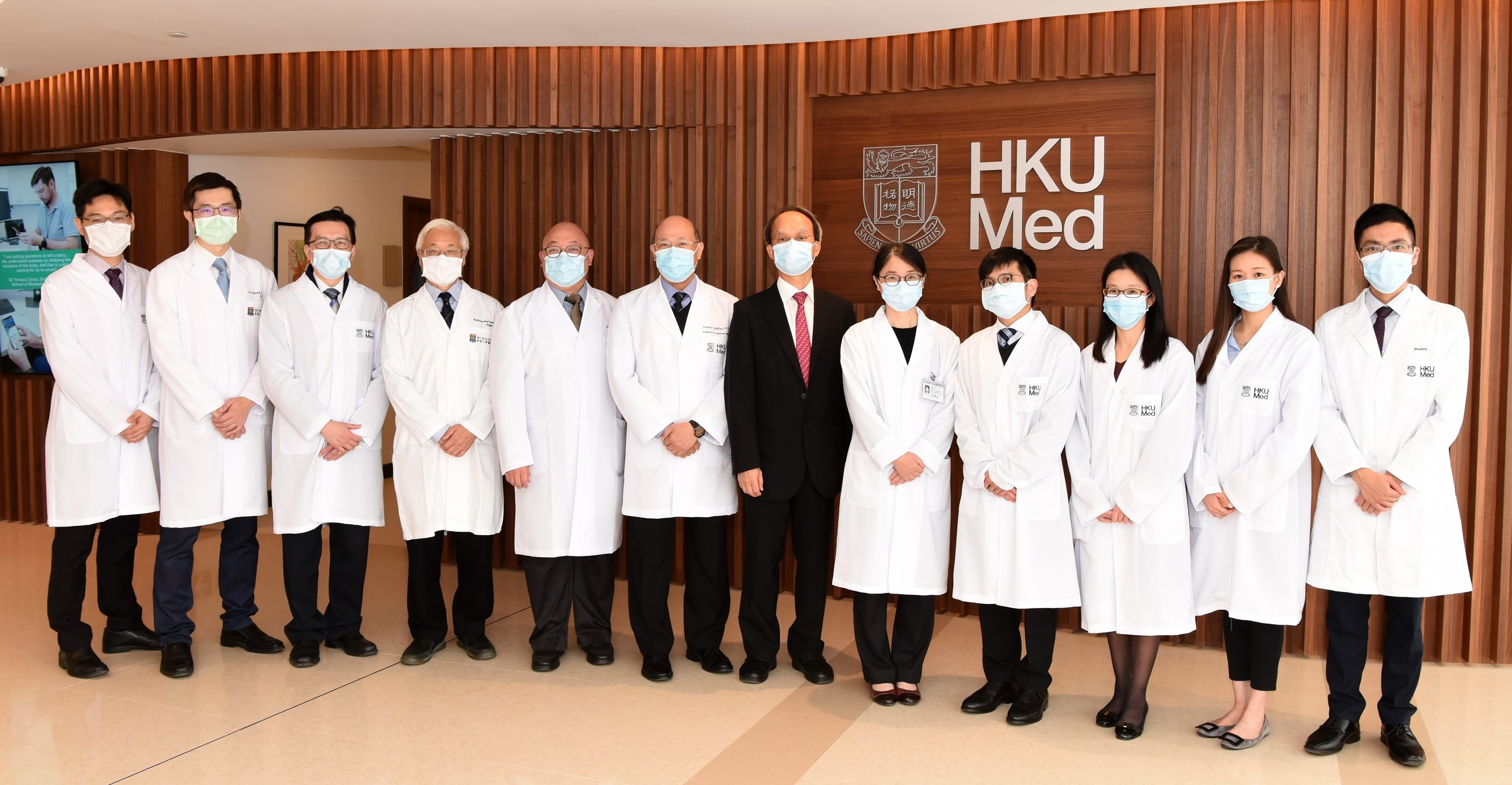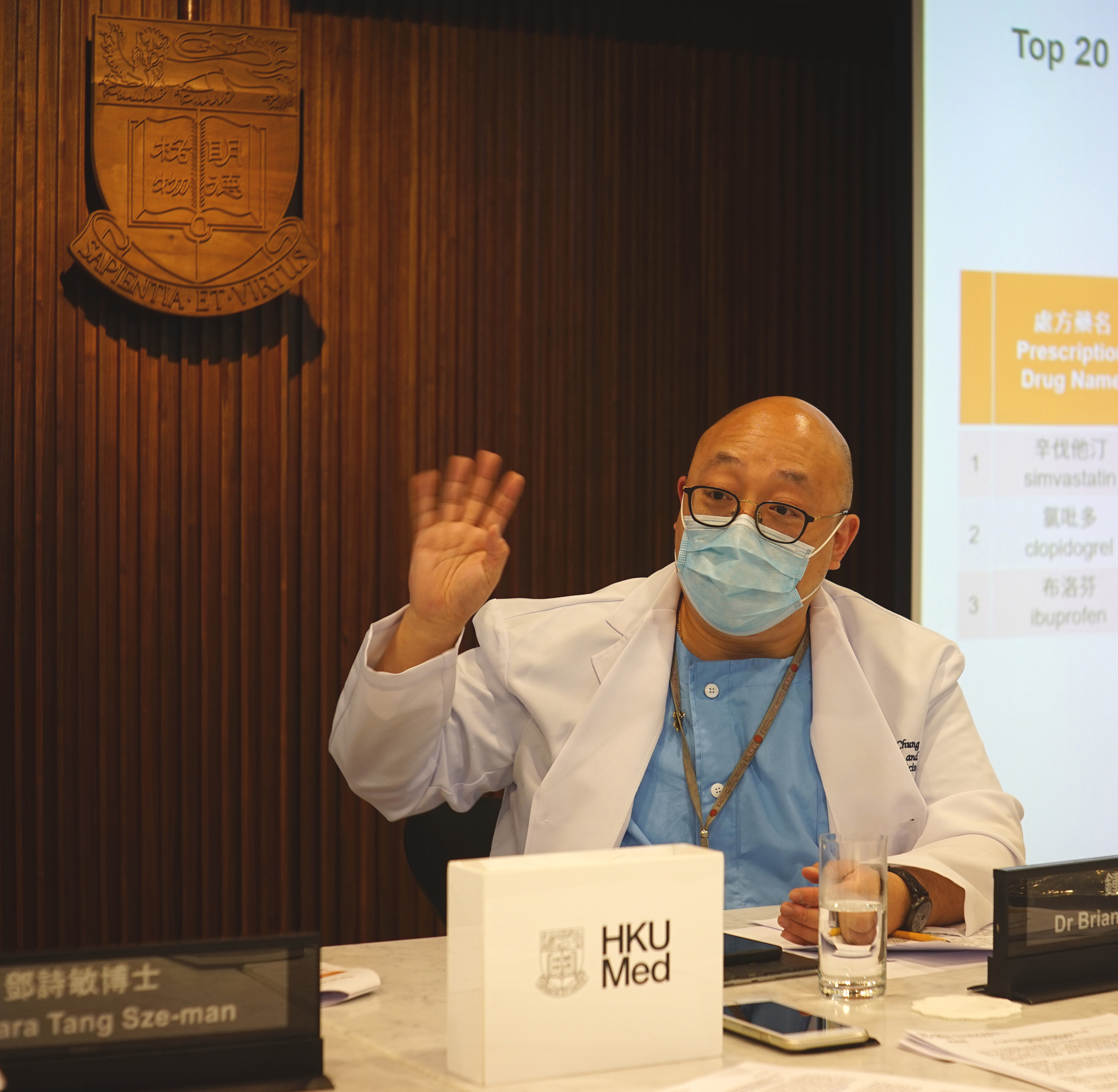09 March 2021
In the first and largest study of its kind among Hong Kong Chinese, a research team at LKS Faculty of Medicine, The University of Hong Kong (HKUMed) has identified 531 rare and predicted deleterious variants in 108 pharmacogenes, among which 96 have never been reported in widely recognised databases. However, these variants were commonly found among Hong Kong Chinese, most of whom (93.6%) having at least one of them. Besides, almost all (99.6%) Hong Kong Chinese residents harboured at least one actionable pharmacogenetic variant, which may impact the effectiveness of drug treatment. This study, which demonstrates the potential of pharmacogenetics in personalised prescription of medicine for reduced risk of adverse reactions and enhanced drug efficacy, has been published in PLOS Genetics [Link to the publication].
About pharmacogenetics
Pharmacogenetics is the study of genetic influences on variability of drug response. Genetic variants in enzyme genes determine the enzyme activities in human body, thus leading to variable rate of drug metabolism. When prescribed with the standard dosage, patients with high metabolism may find the drug less effective than expected as the drug is quickly broken down and loses its function. By contrast, drug remains active for longer in patients with slow metabolism. Blood concentration of drug in these patients may reach toxic levels, causing undesired adverse drug reactions. Over two million patients in the United States suffer from adverse drug reactions every year, incurring a considerable medical cost of US$200 billion1.
About the study
The HKUMed research team examined actionable and rarely documented pharmacogenetic variants using two sets of big data. One was the exome sequencing (ES) data of 1,116 Hong Kong Chinese individuals. Covering more than 20,000 genes, the ES data set of the largest Hong Kong Chinese cohort to date characterises a representative spectrum of every variant.
Another set of big data was the anonymous drug prescription data in the Clinical Data Analysis and Reporting System database of the Hospital Authority (HA), the backbone of Hong Kong public healthcare system serving 7.5 million people in the city. Combining information extracted from these two sets of big data, this research provides reliable evidence for prescription decisions and medical resource management for the Hong Kong Chinese population.
Utilising the largest Hong Kong Chinese pharmacogenetics database to date, the research team identified 531 rare and predicted deleterious variants in 108 pharmacogenes, among which 96 variants have never been reported in any genetic databases. Despite their rarity, 93.6% of the Hong Kong Chinese carried at least one of the 531 rare pharmacogenetic variants.
The research team also evaluated 133 pharmacogenetics variants that are known to affect drug responses in patients. According to international clinical guidelines, these 133 pharmacogenetics variants affect the metabolism of 36 drugs. Consistent with other populations, almost all (99.6%) Hong Kong Chinese residents harboured at least one actionable pharmacogenetic variant, with a median of four. Nevertheless, the local spectrum of actionable variants was different compared to those of foreign populations. For example, when azathioprine is prescribed, local clinicians should consider defective NUDT15 alleles which is about 19 times more frequent in Hong Kong Chinese population than in Europeans and Africans. Defective TPMT alleles should be considered in Europeans instead2,3. This implies that the clinical application of pharmacogenetic guidelines should be customised for different ethnic groups.
Pharmacogenetics for the people
Current pharmacogenetic testing only investigates the genetic influences when high-risk medications are prescribed, or after adverse drug reactions occur. This means the patients could have been impacted before remedial actions are taken. To address this issue, the HKUMed research team recommends a pre-emptive approach, by which pharmacogenetic testing is conducted to provide actionable recommendations to the choice and dosage of drugs based on the genetic profile of each patient before prescription. This approach will help reduce the risk of adverse drug reactions and enhance drug efficacy.
Clinical guideline recommendations associated with pharmacogenetic variants have the potential to be widely adopted in Hong Kong. According to the HA statistics, a total of 1,006,046 Hong Kong Chinese patients had received prescriptions of the 36 drugs that are affected by actionable pharmacogenetics variants in 2019, accounting for one-seventh of the local Chinese population. The research team estimated that 23.1% of the patients receiving the prescribed drugs have actionable pharmacogenetic phenotypes, which should have prescription adjustment according to the international clinical guidelines. Drugs with greatest pharmacogenetic impact include simvastatin (lipid-lowering drug), clopidogrel (antiplatelet drug), and ibuprofen (one of the non-steroidal anti-inflammatory drugs). However, as the research findings showed, there are a substantial number of scarcely documented pharmacogenetic variants commonly found among Hong Kong Chinese patients. This indicates the potential to further develop personalised pharmacogenetic guidelines of medical prescription in Hong Kong to achieve higher drug efficacy with minimised risk of adverse drug reactions.
About the research team
This research was led by Dr Brian Chung Hon-yin, Clinical Associate Professor, Department of Paediatrics and Adolescent Medicine, HKUMed; Dr Clara Tang Sze-man, Assistant Professor, Department of Surgery, HKUMed and Dr Yeung Kit-san, Postdoctoral Fellow, Department of Paediatrics and Adolescent Medicine, HKUMed. Mr Mullin Yu Ho-chung, PhD candidate from Department of Paediatrics and Adolescent Medicine, HKUMed, and Mr Marcus Chan Chun-yin, MBBS Year 6 student, from Department of Paediatrics and Adolescent Medicine, HKUMed are the first authors. Other contributors include: Professor Godfrey Chan Chi-fung, Professor Lau Yu-lung, Dr Lee So-lun, Dr Yang Wanling, Ms Claudia Chung Ching-yan, Dr Christopher Mak Chun-yu, Mr Jeffrey Chau Fong-ting, Ms Mianne Lee, Ms Jasmine Fung Lee-fong, Ms Mandy Tsang Ho-yin, Dr Joshua Chan Chun-ki, Dr Yang Jing and Dr Wilfred Wong Hing-sang from Department of Paediatrics and Adolescent Medicine, HKUMed; Professor Paul Tam Kwong-hang and Dr Patrick Chung Ho-yu from Department of Surgery, HKUMed; Mr William Chui Chun-ming, Mr Andrew Li Wang-tat and Ms Chara Yip Yin-wa from Department of Pharmacy, Queen Mary Hospital.
This study was supported by the Society for the Relief of Disabled Children, the Health and Medical Research Fund of the Food and Health Bureau, Government of the Hong Kong Special Administrative Region; Li Ka Shing Faculty of Medicine - Enhanced New Staff Start-up Research, the Children’s Heart Foundation, and Mr and Mrs Edward CM Wong Foundation.
- Doble B, Schofield DJ, Roscioli T, Mattick JS. Prioritising the application of genomic medicine. NPJ Genom Med. 2017; 2:35.
- Moriyama T, Nishii R, Perez-Andreu V, Yang W, Klussmann FA, Zhao X, et al. NUDT15 polymorphisms alter thiopurine metabolism and hematopoietic toxicity. Nat Genet. 2016; 48(4):367–73.
- Ford LT, Berg JD. Thiopurine S-methyltransferase (TPMT) assessment prior to starting thiopurine drug treatment; a pharmacogenomic test whose time has come. J Clin Pathol. 2010; 63(4):288–95.
Media enquiries
Please contact LKS Faculty of Medicine of The University of Hong Kong by email (medmedia@hku.hk).



Follow HKUMed